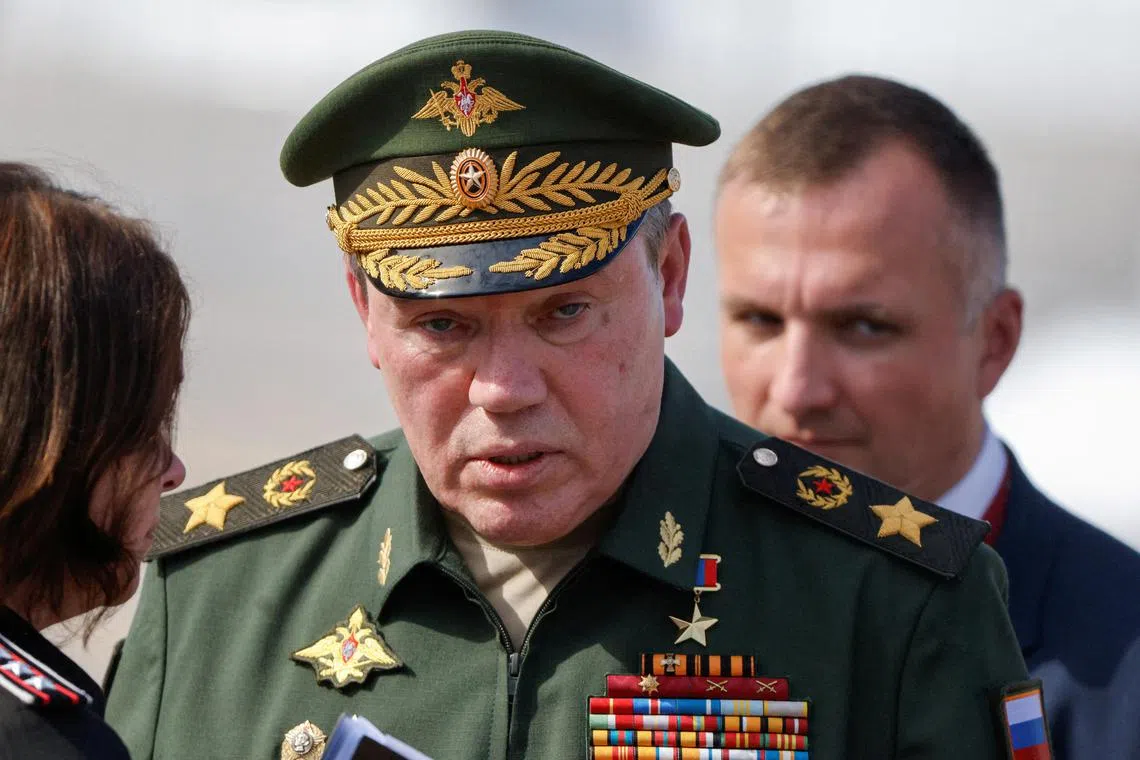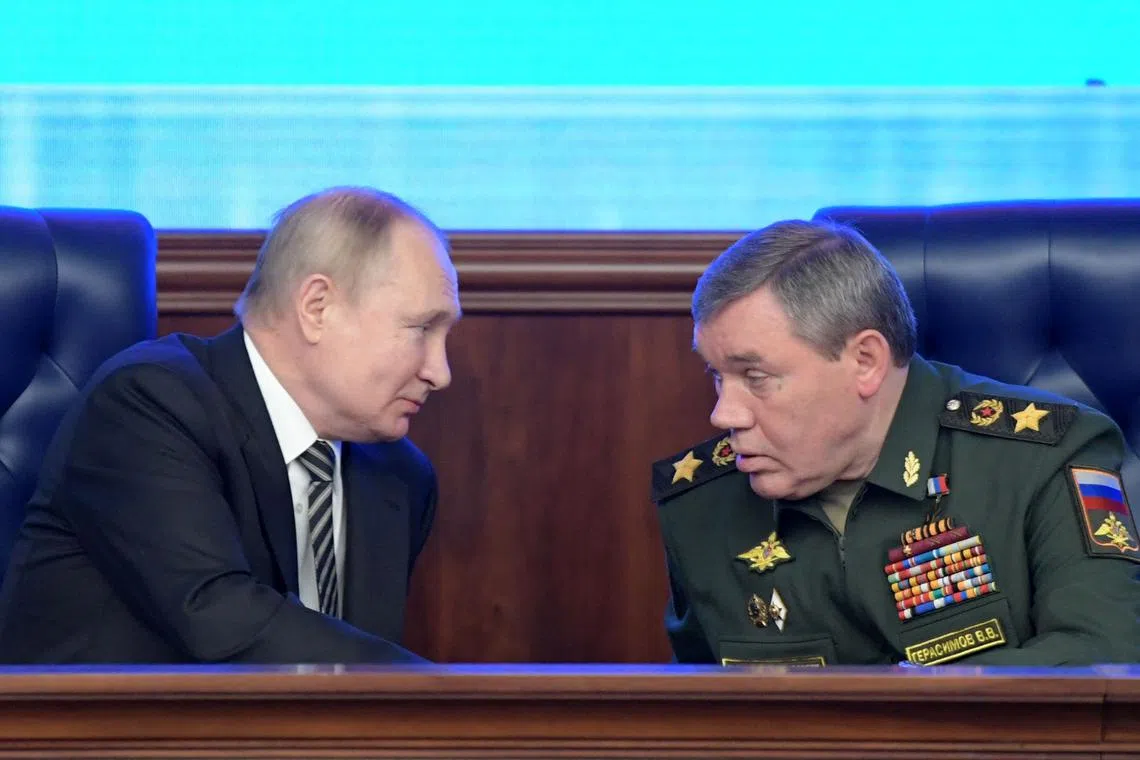Who is Russia's new war commander Gerasimov and why was he appointed?
Sign up now: Get ST's newsletters delivered to your inbox

Russia’s most senior general Valery Gerasimov has been appointed to lead its war in Ukraine.
PHOTO: REUTERS
President Vladimir Putin’s defence minister has appointed Russia’s most senior general, Chief of the General Staff Valery Gerasimov, 67, to lead its war in Ukraine, the most dramatic in a series of senior command changes since Russia invaded in February.
Criticism
Many of the nationalist war bloggers who have licence from the Kremlin to criticise the conduct of the war have blamed General Gerasimov for the fact that a superpower military - supposedly modernised and expensively re-equipped in the last 15 years - has failed so signally to subjugate its much smaller neighbour.
Critics in Ukraine, the West and even inside Russia cast the Russian armed forces as naive, poorly prepared and equipped, slow to react, and riven by disparate and often distant command structures.
After the failure of an unplanned mobilisation campaign to turn the tide in Russia’s favour, rumours had swirled for months that Gen Gerasimov, largely invisible to the public, would be sidelined.
Both Mr Yevgeny Prigozhin, founder of the Wagner Group contract militia, and Mr Ramzan Kadyrov, leader of the southern Russian republic of Chechnya, have made thinly veiled criticisms of Gen Gerasimov while demonstratively claiming battlefield successes for their own, supposedly superior, semi-autonomous forces.
Supporters of the defence ministry say Russia often performs poorly at the start of wars, and that many of the problems that have become apparent in supply, technology and command over the past 10 months have been or are being resolved.
What does it mean for the battlefield?
The defence ministry said the seniority of the commander in charge of the “special military operation” reflects the expansion of its scale and the need to improve organisation and command.
Gen Gerasimov’s deputies will be Army General Sergei Surovikin, the previous theatre commander, appointed three months ago and nicknamed “General Armageddon”; Army General Oleg Salyukov; and Deputy Chief of the General Staff Colonel-General Alexei Kim.
Mr Igor Korotchenko, a hardline military expert who is given generous space on state television, said Mr Putin’s decision stemmed from Ukraine’s receipt of longer-range heavy weapons from the West and the prospect that it would soon receive Western armoured fighting vehicles and possibly battle tanks.
He said Gen Gerasimov’s arrival increased the likelihood that Russia might use battlefield nuclear weapons in Ukraine: “The appointment of Gerasimov means that all means of destruction in the arsenals of the Armed Forces of the Russian Federation - without exception - can be used.”
Defence Minister Sergei Shoigu vowed on Tuesday to build a deeper arsenal of weapons, bolster aviation technology to better evade air defences and improve drone production.
What about the politics?
By putting Gen Gerasimov in direct command, Mr Putin can send a signal to the West about his determination to win the war, reinforce the standing of the army relative to Mr Prigozhin and Mr Kadyrov’s militias and, not least, make his top general more accountable for the day-to-day conduct of the invasion.
“Now the General Staff is directly and uncompromisingly responsible for absolutely everything,” said Mr Semyon Pegov, a Russian military blogger who uses the name Wargonzo.
“‘General Armageddon’ is still at the centre of decision-making, but in a much less vulnerable position.”

By putting General Gerasimov in direct command, Mr Putin can send a signal to the West about his determination to win the war.
PHOTO: AFP
Ms Tatiana Stanovaya, founder of the R.Politik analysis firm, was unconvinced that the change would make much difference.
“Gerasimov was handed command of the military operation because of Surovikin’s serious setbacks,” she said. “Putin is looking for effective tactics against the background of a ‘creeping’ defeat.”
“He is trying to reshuffle the pieces and is therefore giving chances to those he finds persuasive. Today, Gerasimov turned out to be persuasive. Tomorrow it could be anybody else.”
Who is Gerasimov?
Gen Gerasimov was appointed chief of the general staff and deputy defence minister by Mr Putin on Nov 9, 2012, three days after Mr Putin’s long-time ally Shoigu was made defence minister.
Each of the men holds one of the three nuclear briefcases that can order a Russian nuclear strike.
Gen Gerasimov played key roles in Russia’s seizure of Crimea from Ukraine in 2014 and in Russia’s game-changing military support for President Bashar al-Assad in the Syrian Civil War.
The US State Department sanctioned him the day after the invasion of Ukraine, saying he was one of three senior Russians alongside Mr Putin who were directly responsible for the war.
Nevertheless, Gen Gerasimov sometimes speaks with US Army General Mark Milley, the chairman of the US Joint Chiefs of Staff.
Gen Gerasimov was born on Sept 8, 1955, in Kazan, rising through the ranks from Russia’s tank forces to graduate in 1997 from the Military Academy of the General Staff. REUTERS


